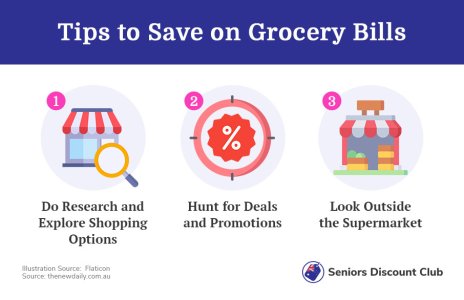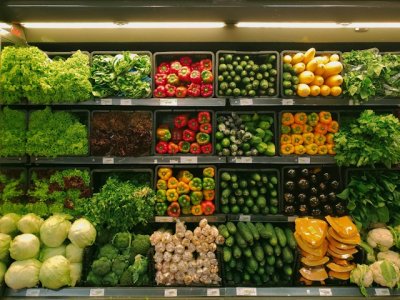Slash your grocery bill with these genius money-saving tips from experts!
By
Seia Ibanez
- Replies 4
As the cost of living continues to rise and the effects of inflation are felt across the nation, many find themselves under financial pressure.
With grocery bills becoming a significant source of stress, it's more important than ever to find ways to stretch your dollar further.
Almost half—or 42 per cent—of the average household now said that groceries are one of their most stressful expenses—spending around $188 per week on groceries as per the latest Finder data.
According to the Australian Bureau of Statistics, prices for several staples have also soared—bread rose 9.6 per cent, daily goods by 6.4 per cent, and eggs by 10.6 per cent in 2023.
However, it's not all doom and gloom.
Beef and veal prices fell by 4.5 per cent, lamb by 15 per cent, and fruit and vegetable prices by 0.2 per cent last year.
A mixed bag of price changes means that with some strategy and savvy shopping, you can still manage your grocery budget effectively.
Here are some expert tips to help you save on your grocery bill:
1. Do Research and Explore Shopping Options
One Big Switch Analyst Joel Gibson pointed out that supermarkets often discount certain items each week to draw customers in.
‘The way these businesses work is they will heavily discount certain items each week as a way to get you into the store, but then they’ll make their money out of other items,’ he said.
‘You have to keep an eye on that if you want to pick the eyes out of the prices.’
To score on these deals, check the supermarkets' discount lists, usually published on Monday evenings for the coming week. This will help you plan where to shop for the best prices.
Graham Cooke, Finder’s Head of Consumer Research, suggested comparing prices at your two closest supermarkets, which can easily be done using their online shopping apps.
‘Shopping around is the best thing to do,’ Cooke said.
Later this year, the task of comparing grocery prices will become even easier when consumer group CHOICE begins publishing regular reports on supermarket pricing, thanks to government funding.
In a previous story, CHOICE conducted a survey where it found that 60 per cent of shoppers believed the supermarkets are 'making a lot of money from price hikes’.
The same survey also revealed that there is a growing concern among Australians about the rising prices of food items.
2. Hunt for Deals and Promotions
While it may seem tedious, hunting for promotions can yield significant savings.
Shopping later in the day can often result in finding markdowns on perishable items. Additionally, supermarket loyalty programs offer benefits like cash back or frequent flyer points.
Woolworths, for instance, has started offering 'member-exclusive' deals to customers in its loyalty program.
However, it's important to remember that you're exchanging your shopping data for these discounts.
‘You’re trading your data for that discount,’ Gibson said.
He also emphasised that while loyalty programs can be valuable, they should not distract from the primary goal of securing the lowest prices.
He warned that the perceived value of these programs can sometimes be inflated.
‘They make them seem more valuable than they actually are,’ he said.
3. Look Outside the Supermarket
Consider purchasing non-perishable items from online retailers like Amazon or catch.com.au, where prices can be more competitive.
Discount stores like The Reject Shop can also offer savings, especially for bulk purchases.
For fresh produce, larger markets or buying in syndicates with other families can provide better value than supermarket chains.
‘I’ve been in syndicates before with other families, buying for four families,’ Gibson said.
‘There are ways to do it. It’s just a little bit more work, of course.’

By implementing these strategies, you can take control of your grocery spending and make your budget go further.
 Do you have other money-saving tips when going grocery shopping? Share them with us in the comments below!
Do you have other money-saving tips when going grocery shopping? Share them with us in the comments below!
With grocery bills becoming a significant source of stress, it's more important than ever to find ways to stretch your dollar further.
Almost half—or 42 per cent—of the average household now said that groceries are one of their most stressful expenses—spending around $188 per week on groceries as per the latest Finder data.
According to the Australian Bureau of Statistics, prices for several staples have also soared—bread rose 9.6 per cent, daily goods by 6.4 per cent, and eggs by 10.6 per cent in 2023.
However, it's not all doom and gloom.
Beef and veal prices fell by 4.5 per cent, lamb by 15 per cent, and fruit and vegetable prices by 0.2 per cent last year.
A mixed bag of price changes means that with some strategy and savvy shopping, you can still manage your grocery budget effectively.
Here are some expert tips to help you save on your grocery bill:
1. Do Research and Explore Shopping Options
One Big Switch Analyst Joel Gibson pointed out that supermarkets often discount certain items each week to draw customers in.
‘The way these businesses work is they will heavily discount certain items each week as a way to get you into the store, but then they’ll make their money out of other items,’ he said.
‘You have to keep an eye on that if you want to pick the eyes out of the prices.’
To score on these deals, check the supermarkets' discount lists, usually published on Monday evenings for the coming week. This will help you plan where to shop for the best prices.
Graham Cooke, Finder’s Head of Consumer Research, suggested comparing prices at your two closest supermarkets, which can easily be done using their online shopping apps.
‘Shopping around is the best thing to do,’ Cooke said.
Later this year, the task of comparing grocery prices will become even easier when consumer group CHOICE begins publishing regular reports on supermarket pricing, thanks to government funding.
In a previous story, CHOICE conducted a survey where it found that 60 per cent of shoppers believed the supermarkets are 'making a lot of money from price hikes’.
The same survey also revealed that there is a growing concern among Australians about the rising prices of food items.
2. Hunt for Deals and Promotions
While it may seem tedious, hunting for promotions can yield significant savings.
Shopping later in the day can often result in finding markdowns on perishable items. Additionally, supermarket loyalty programs offer benefits like cash back or frequent flyer points.
Woolworths, for instance, has started offering 'member-exclusive' deals to customers in its loyalty program.
However, it's important to remember that you're exchanging your shopping data for these discounts.
‘You’re trading your data for that discount,’ Gibson said.
He also emphasised that while loyalty programs can be valuable, they should not distract from the primary goal of securing the lowest prices.
He warned that the perceived value of these programs can sometimes be inflated.
‘They make them seem more valuable than they actually are,’ he said.
3. Look Outside the Supermarket
Consider purchasing non-perishable items from online retailers like Amazon or catch.com.au, where prices can be more competitive.
Discount stores like The Reject Shop can also offer savings, especially for bulk purchases.
For fresh produce, larger markets or buying in syndicates with other families can provide better value than supermarket chains.
‘I’ve been in syndicates before with other families, buying for four families,’ Gibson said.
‘There are ways to do it. It’s just a little bit more work, of course.’

By implementing these strategies, you can take control of your grocery spending and make your budget go further.
Key Takeaways
- High grocery bills are stressing almost half of Australian households, with the average spending at $188 per week.
- Certain grocery staples have seen significant price increases in 2023, while others, like beef, veal, and lamb, have declined.
- Researching, shopping around, and timing purchases to coincide with supermarkets' discount schedules can result in consumer savings.
- Supermarket loyalty programs might offer benefits, but it's also worth looking outside the supermarket for non-perishable items and bulk buys for additional savings.








